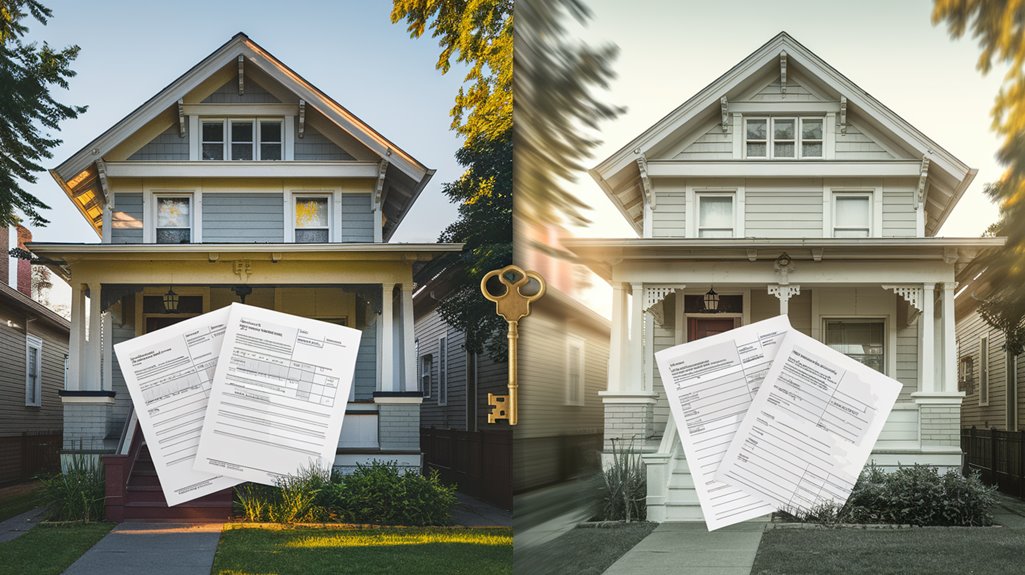
Selling a house from a trust after someone’s death brings complex tax challenges. You might worry about inheritance taxes, capital gains, and trust-specific regulations.
When executors or beneficiaries overlook these tax implications, they risk losing significant value from their inheritance. We understand the stress of managing estate taxes while grieving.
If you make wrong tax decisions, you could face unexpected bills or IRS penalties. Since tax laws change frequently, keeping up with regulations becomes overwhelming.
The sale of a house in a trust after death requires careful tax planning, proper basis calculation, and timely filing of estate documents to minimize tax burden.
This guide will walk you through essential tax considerations and help you make informed decisions during the sale process.

A trust is a legal arrangement that protects your home and other assets after death. You can transfer your house into a trust through a formal deed process. When you choose a trust, two main options exist: revocable and irrevocable trusts.
This decision will affect how your property transfers to your loved ones. If you select a revocable trust, you maintain control over your home during your lifetime.
We recommend revocable trusts for their flexibility in changing terms. Your beneficiaries will receive valuable tax benefits through a step-up basis with revocable trusts.
Irrevocable trusts offer strong asset protection but limit your control. So, you must carefully consider your long-term goals before making this choice.
You should consult with an attorney to understand specific tax implications. While trusts seem complex, they provide clear benefits for estate planning.
If you plan correctly, your heirs will avoid probate court and save money. Since trusts streamline property transfer, beneficiaries can manage assets more efficiently.
The right trust structure depends on your unique financial situation. Hence, careful evaluation of both trust types will lead to better estate planning.
Selling a house in a trust can lead to different tax responsibilities. You must pay capital gains tax on profits from the property sale. The tax calculation starts from the property’s step-up value after the grantor’s death.
If you serve as a trustee, it will affect your specific tax duties. While the estate taxes get resolved before asset distribution, trust types determine tax outcomes.
You will face state-specific inheritance tax rules for property sales. Some states offer tax breaks to certain family members who inherit property. This situation depends on your local tax laws and trust arrangements.
Since tax laws can be complex, hiring a tax expert is wise. They can help you understand all property sale rules. A professional advisor will suggest ways to reduce your tax payments.
If you plan ahead, you can manage these tax obligations better. We recommend keeping detailed records of all trust-related transactions. This practice helps when filing tax returns or answering IRS questions.

A step-up in basis adjusts an inherited property’s value to its fair market price at death. You will pay lower capital gains tax when selling property received through inheritance. This tax benefit applies specifically to assets transferred through certain types of trusts.
If you inherit through a revocable trust, you’ll receive the step-up in basis advantage. We calculate the new basis using the property’s value on the date of death. The tax savings can be substantial when you decide to sell inherited assets.
Since irrevocable trusts work differently, they don’t provide the step-up benefit to beneficiaries. You must use the original purchase price to determine your capital gains tax. This rule makes irrevocable trusts less advantageous for tax planning.

Trust property requires careful estate tax planning to protect your beneficiary’s future inheritance. You must include all trust assets when calculating your total taxable estate value. We recommend getting professional appraisals for accurate property valuations.
If you set up an irrevocable trust, it can lower your overall estate tax burden. Your estate will handle all tax payments before distributing assets to beneficiaries. This approach shields your heirs from unexpected tax obligations.
Since tax laws change frequently, you should review your trust strategy regularly. While standard trusts offer many benefits, they cannot eliminate estate taxes completely. So, you need to consider different trust options for effective tax management.
If your estate exceeds the tax threshold, proper planning becomes essential. Your beneficiaries will receive their inheritance only after the estate settles tax obligations. Hence, early planning helps maximize the value passed to future generations.

The tax treatment differs significantly between revocable and irrevocable trusts for estate planning purposes. You must understand how each trust type affects your tax obligations. A revocable trust lets you maintain control of your assets during your lifetime. The income from a revocable trust flows directly to your personal tax return.
If you create an irrevocable trust, you will permanently transfer assets out of your estate. This type of trust functions as a separate tax entity from the grantor. So the trustee must file annual tax returns for the trust.
A key advantage of revocable trusts is the step-up in basis at death. Your beneficiaries will pay less capital gains tax when they sell inherited property.
We see different tax consequences with irrevocable trusts since assets transfer immediately. The original purchase price determines the capital gains tax basis for future sales.
While both trusts help avoid probate costs, they serve different tax planning goals. You should consult a tax advisor before choosing between these options.
If tax minimization is your primary concern, a revocable trust might work better. The flexibility allows you to adapt to changing tax laws over time.
The IRS requires specific forms when reporting a house sale from a trust. You must file Form 1041 to report any capital gains tax. The tax calculates the difference between selling price and property value at death.
If you manage an irrevocable trust, Schedule K-1s must go to all beneficiaries. This document shows each person’s share of the income. When the sale impacts estate value, Form 706 becomes necessary for estate taxes.
So, you should keep detailed records of all transactions and expenses. If the basis changes over time, you must document these adjustments carefully. The IRS will need proof of your sale calculations and tax payments.
We recommend working with a tax professional for complex trust sales. This step helps ensure full compliance with current IRS rules. If you make mistakes on these forms, penalties could apply.
Smart tax planning helps reduce costs when selling property from a trust. You can benefit from the step-up basis rule when property values change after death. If you live in the house for two years, you’ll qualify for tax exclusions.
This rule allows single owners to exclude $250,000 from their taxable gains. We recommend married couples take advantage of their $500,000 joint exclusion benefit.
You should meet with a tax expert before starting the sale process. This meeting will reveal trust-specific tax breaks and local tax rules. Your records of all expenses during the sale will lower the tax amount.
Since taxes vary by state, proper planning makes a big difference. If you track every cost from repairs to closing fees, your tax bill will decrease. While selling takes time, good record-keeping saves money in the long run.
Tax implications from selling trust properties carry significant financial consequences after a death. The step-up basis affects capital gains taxes, while trust types determine specific obligations. You must follow IRS guidelines and work with tax experts for proper handling.
We at OR Home Buyers specialize in purchasing trust-held properties for cash. Our team handles all paperwork and tax-related documentation for a smooth transaction. You can avoid complex tax situations by selling your trust property to us. If you want a hassle-free sale, call OR Home Buyers today at (541) 722-2000. Since we are cash home buyers, we can close within seven days.

Hi, I’m Bob Bash, founder of OR Home Buyers, serving the Oregon community since 2017. We provide full-service real estate solutions, specializing in cash purchases for both residential and commercial properties. I started this business to help our community navigate difficult real estate situations with professionalism, ethics, and compassion.
My goal is simple: to make every client feel relieved and happy when their real estate challenges are resolved. Helping people find solutions and peace of mind is what drives me every day.
Sell Your Oregon Home Quickly. Receive a fair cash offer within 24 hours. We buy homes as-is, including complex titles, estates, and foreclosures. No repairs, no fees, no stress. A simple solution for a fast, flexible closing.
590 Pearl St suite 317, Eugene, OR 97401
@ 2024 OR Home Buyers. All Right Reserved
